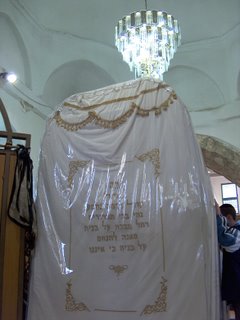Lisa Goldman hat sich dankenswerterweise die Arbeit gemacht, einen Artikel von Meir Schalev ins Englische zu übersetzen: State and Homeland ist ein pragmatischer Artikel darüber, wie es weitergehen könnte:
The State of Israel and the land of our forefathers are not the same thing, but the difference is not clear to many people. The state is a tool of management; it has pragmatic considerations, legal borders and policies. The homeland does not. Homeland is a historical and spiritual idea, and those who love it are inclined to sentimentalism and extremism. In the Middle East, however, there is another difference. The citizens of the state are living beings. Citizens of the homeland, on the other hand, are dead. But their influence is far greater.
And thus, to me and to the rest of Israels citizens it is difficult to compete with King David, Jesus, the Matriarch Rachel and Salah a-Din. It is difficult for our houses to compete with their tombs. That is why we must be resolute and strong. We must understand that the next generation, like every generation, will have the right to decide in which state and according to which borders they are willing and able to live. And so, after a 40-year struggle of belligerence and stupidity, Israel has finally understood that it must return the territories it conquered in the Six Day War. We are giving up part of our homeland in order to have a better and more normal state.
Wenig später geht es auch um das Grab Rachels in der Nähe von Gilo, für mich Ort die mit einer gewissen Emotionalität verbunden sind, meist ist es die Angst davor, dass der blinde und wütende Mob diese heiligen Orte zerstört - so wie es ja auch an Josefs Grab geschehen ist. Dennoch scheint Meir Schalev Recht zu haben; übermässige Emotionalität wäre vielleicht auch das ungesündeste an diesem Ort zu dieser Zeit und das gilt aber für alle Beteiligten.
